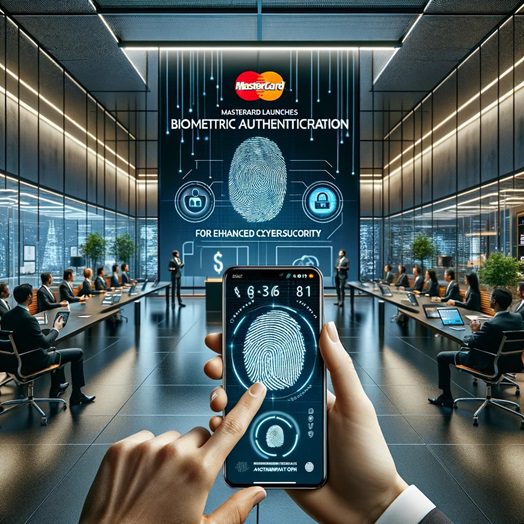 In an era where digital security concerns are at the forefront of consumer consciousness, Mastercard has taken a monumental leap forward by introducing its new Biometric Authentication Service. This innovative solution is poised to revolutionize how we perceive and interact with cybersecurity, marking a significant departure from the traditional password-centric approach.
In an era where digital security concerns are at the forefront of consumer consciousness, Mastercard has taken a monumental leap forward by introducing its new Biometric Authentication Service. This innovative solution is poised to revolutionize how we perceive and interact with cybersecurity, marking a significant departure from the traditional password-centric approach.
The impetus for this transformative change stems from a universal sentiment of frustration and anxiety around password management. Research indicates that nearly 70% of consumers are overwhelmed by the number of passwords they must remember, casting a shadow of doubt over their efficacy in safeguarding personal data. This sentiment is echoed by Dennis Gamiello, Executive Vice President of Identity Products and Innovation at Mastercard, who highlighted the vulnerability of passwords in our increasingly digital world. “Roughly 80% of confirmed data breaches are related to weak or stolen passwords,” he states, underscoring the urgent need for a more robust and user-friendly solution.
Mastercard’s response to this challenge is a paradigm shift from passwords to personal identification. The Biometric Authentication Service, grounded in the Fast Identity Online (FIDO) Alliance principles – a tech-industry initiative Mastercard joined in 2012 – offers a more seamless and secure authentication method. This service leverages biometrics, such as fingerprints, iris scans, or facial recognition, to authenticate users, simplifying and securing digital interactions.
This breakthrough service harnesses the power of artificial intelligence and the widespread availability of smart devices to transform digital interactions into a secure, frictionless experience. By utilizing biometric authentication for tasks such as logging into apps, making online purchases, or accessing personal accounts, Mastercard eliminates the cumbersome and often insecure process of password input and multi-factor authentication prompts.
The mechanics of this system are ingeniously simple yet profoundly effective. FIDO standards create an encrypted key pair, or a passkey, stored on the user’s device. This passkey is only accessible via the user’s unique biometric data, such as a fingerprint or facial recognition, ensuring a level of security that is as convenient as it is robust. These passkeys, operable across various devices, offer a unified authentication experience, irrespective of the platform or device.
For businesses and financial institutions, the implications are equally transformative. Adopting Mastercard’s Biometric Authentication Service could lead to reduced operational costs and a vastly improved consumer experience. It represents a win-win situation, where security is tightened without compromising the ease of use.
This development is particularly relevant in the context of strong customer authentication (SCA) requirements in regions like the European Economic Area and the U.K., where online payment security is paramount. However, its applicability is not limited to these areas. In countries like the U.S., where SCA is not mandated, the need for robust multi-factor authentication is equally pressing, and Mastercard’s solution offers a universally applicable answer.
Consider the scenario of an unusual purchase triggering a bank’s fraud detection system. With Mastercard’s service, a simple biometric confirmation, such as a fingerprint or facial recognition, can swiftly and securely validate the transaction, enhancing the customer experience without compromising security.
Another critical component of this service is tokenization, which safeguards payment credentials from being copied or reused. When used with biometric authentication, tokenization offers an additional layer of security, particularly vital in online transactions.
Gamiello emphasizes the inherent security of this new service, noting that all personal data remains on the user’s device, significantly reducing the risk of hacks or identity theft. “You don’t have to share any secrets, like your password or answers to security questions,” he adds, highlighting the enhanced security of keeping sensitive information private.
The resistance to phishing is another standout feature of the FIDO passkeys. Since no passwords or codes are shared, the risk of phishing attacks is drastically reduced. Moreover, the system’s interoperability ensures functionality across different devices and regions, making it a truly global solution.
With over 4 billion smart devices already FIDO passkey-ready, the potential applications of this technology extend far beyond payments. From opening new accounts to secure app and web logins and even facilitating open banking, the opportunities are vast and varied.
Mastercard’s Biometric Authentication Service is not just a step but a giant leap forward in digital security. It represents a fundamental rethinking of securing our digital identities, making the process more intuitive, seamless, and secure. As we move towards a more digitized world, the need for robust cybersecurity measures has never been more critical. This service addresses that need head-on, providing a solution that is about keeping pace with digital advancements and staying ahead of them.
The implications of this development are far-reaching. It spells the end of the password era, a long overdue change for consumers. The convenience of using biometrics means that security no longer has to be a cumbersome process. Instead, it becomes a natural part of the digital experience, one that users may not even consciously notice. This shift has the potential to dramatically reduce the anxiety and frustration associated with password management, making digital interactions more enjoyable and stress-free.
For businesses, the advantages are equally significant. Adopting this technology can offer their customers a more secure and streamlined experience. This can increase customer satisfaction and loyalty as users gravitate towards platforms that provide ease and security. Furthermore, reducing password-related breaches can lead to decreased associated costs, such as those incurred from handling security incidents and customer support related to password issues.
The Mastercard Biometric Authentication Service also sets a new standard in the industry, challenging other companies to raise their cybersecurity game. As more businesses adopt similar technologies, we could see a ripple effect that leads to a more secure digital landscape overall.
In conclusion, Mastercard’s Biometric Authentication Service represents a significant milestone in the evolution of digital security. It offers a glimpse into a future where our digital interactions are secured not by something we remember but by who we are. This transition from password-based security to biometric authentication is not just a technological upgrade; it’s a fundamental shift in how we protect our digital identities. It’s a change that promises to make our digital lives more secure, convenient, and enjoyable, and it can’t come soon enough.
As we navigate the complexities of the digital age, innovations like Mastercard’s Biometric Authentication Service will play a crucial role in shaping a safer, more seamless digital world for everyone.
Written by: Supaporn Pholrach (Joom)

